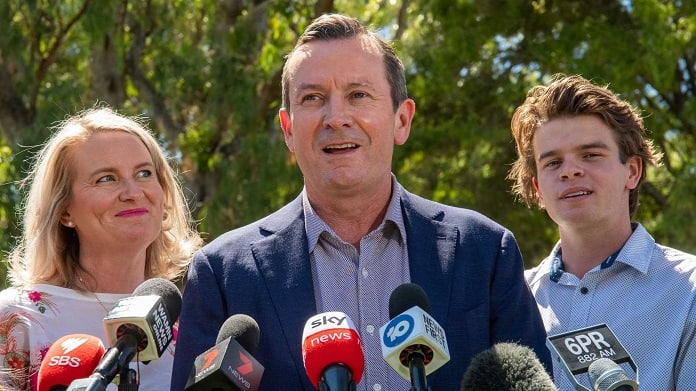Labor has won the West Australian election in a landslide, on course to take 52 of the state’s 59 lower house seats. Liberal leader Zak Kirkup lost his own seat and the wipe-out leaves the Nationals’ Mia Davies poised to become opposition leader.
The scale of the win has seen Labor claim a succession of previously rock-solid Liberal strongholds throughout Perth’s affluent riverside suburbs. Blue-ribbon seats including Bateman, South Perth, Churchlands and probably even the very affluent Nedlands have all turned to Labor.
The Liberals could end up with just three seats and the Nationals four. Labor is also likely to gain control of the state’s upper house. The Greens suffered a 1.8 per cent swing against them and may win only one seat in the upper house, down by three.
In an extraordinary move Kirkup conceded early on in the campaign that the Liberals could not win government, urging Western Australians not to give Labor “total control”. That mission well and truly failed.
Premier Mark McGowan’s support has been built on his seemingly strong response to COVID-19. Closing the borders to the rest of Australia was an overwhelmingly popular move in WA.
His government, however, should not be mistaken as a government for the many. Over the past four years it has privatised so many assets that former Liberal Shadow Treasurer Dean Nalder complained: “This is a government that promised they would stop privatisations [but] to date they have committed privatisations to an amount 10 times what the former [Liberal] government did.”
The McGowan government abolished the Department of Aboriginal Affairs, with key functions moved into the Department of the Premier and Cabinet. The commitment to Aboriginal heritage can be seen in McGowan’s flat refusal to suspend the decision-making process that allowed Rio Tinto to blow up Juukan Gorge.
Failing test on pollution
This goes along with his attack on the Environmental Protection Agency for going too far with its proposed guidelines aimed at cutting greenhouse gas emissions.
Labor’s promises on the environment during the election campaign couldn’t fill anyone with confidence either.
Labor plans to buy a $100 million battery to help stabilise the power grid and is talking of building one of the longest continuous electric vehicle networks in the world.
These promises are part of a suite of measures worth $300 million but they are accompanied only by an “aspirational” aim of achieving net zero greenhouse gas emissions by 2050.
The Conservation Council of WA has criticised the policy, saying it failed the key test on cutting pollution because it did not set legislated targets to reduce greenhouse gasses.
The Council’s director Piers Verstegen said: “WA is the only state in Australia with rising carbon pollution and this policy offers no concrete plan or targets to get this pollution under control. This undermines efforts under the Paris Agreement and could put the nail in the coffin even for Australia’s modest national emissions reduction targets.”
At war with unions
WA Labor is at war with unions over automation in ports and has become the darling of business in its relentless pursuit of jobs growth. Wages, however, are likely to continue to stagnate. In the October 2020 budget the state’s 150,000 public sector workers were limited to wage increases of $1000 for the next two years.
Then UnionsWA Secretary, Meredith Hammat, commented: “These are the same workers that did the heavy lifting during the difficult times of the pandemic, people in our schools, in our hospitals, who have kept our communities safe.” That critique didn’t stop Hammat from standing and winning as the ALP candidate for Mirrabooka.
McGowan also stoked West Australian parochialism in the election saying: “East coast FIFO [fly in, fly out workers] should be the rare exception. Not a common practice.”
According to his jobs plan, $15 million would be funnelled into helping local manufacturers produce components for rail wagons used by the iron ore industry, another indicator of McGowan’s preference for the mining industry over the environment.
With this raft of neo-liberal policies and playing on West Australian distrust of Canberra and the eastern states, it is perhaps little wonder so many Liberal voters were willing to vote for McGowan.
With Labor sitting on a super majority we need to take a cue from the CFMMEU and its willingness to campaign during the election against the McGowan government over moving maritime jobs from Fremantle harbour.
If we are to protect the environment, fight for better pay and decent jobs, and stand up for Aboriginal rights then the fight will need to be taken to workplaces and the streets.
By Joel Connolly






